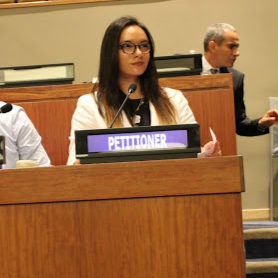Raised by two teachers, Leilani has always had a sense of curiosity that drives her. She inherited her mother’s passion for science and developed a respect and love for the world around her. Growing up, her father encouraged her to read and taught her how to find her voice as a writer. It is because of her parents that Leilani has become a storyteller, an organizer, and a cultural preservationist.
In 2003 Leilani became a big sister – her favorite title. She is CHamoru from Guåhan’s Romeo and Jeje clans and has roots in occupied Hawai’i and the Philippines. Her grandmother is a survivor of the Japanese occupation of Guåhan and her grandfather (and his family) worked on the sugarcane and pineapple plantations in Hawai’i. Today, her grandmother loves cooking and playing mahjong and her grandfather, like his father, cultivates orchids. Leilani has worked hard to build a close relationship with her grandparents and uses their stories and guidance in her writing – especially her recent thesis. Under advisement from torture prevention expert Darius Rejali, Leilani recently completed Guam: I Leblo Ålunan, her first attempt to Indigenize the field of Political Science. The piece brings together first-hand accounts, academic research, and Leilani’s own poetry to explore how trauma and violence impacts an Indigenous community’s ability to carry and share a cohesive narrative. Throughout, she argues that ecological embeddedness is the ideal path towards a decolonial future. She and her ancestors are looking forward to sharing that message and fighting against genocidal climate change at COP 25.


